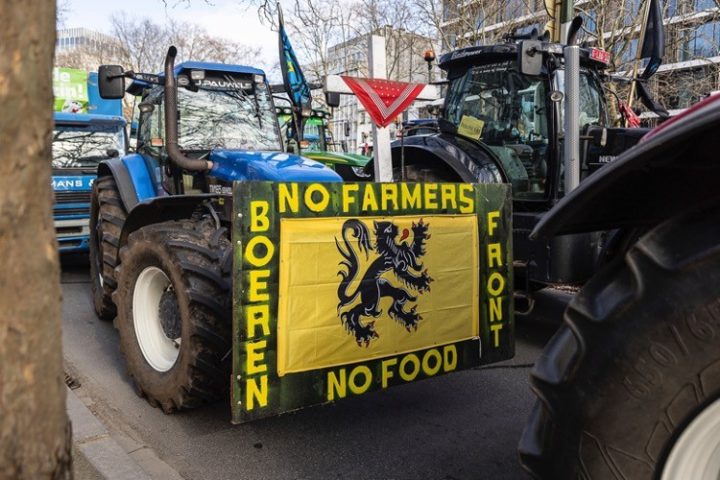
Claiming that ecosystems in Flanders, the Dutch-speaking northern region of Belgium, have been undermined by nitrogen pollution, a “green” dossier released by the Flemish government aims to reduce nitrogen emissions in the region.
However, these plans threaten to hamstring farmers and undermine the farming industry as a whole in Belgium, similar to the war on farmers being waged in the Netherlands immediately to the north. According to various media reports, the blueprint may directly affect 5,000 jobs, and indirectly impact 15,000 jobs. Several agricultural organizations in the region have declared that the rules “will cause a socio-economic carnage,” and have called for more opportunities for the future of regional farming.
Furthermore, on March 3, echoing last year’s massive farmer protests in the Netherlands, thousands of Belgian farmers drove up to Brussels to object to plans to reduce nitrogen emissions proposed by the regional government, which are perceived by many to be kowtowing to the EU’s “green” agenda.
Although police estimated the number of tractors gathered on the streets of Brussels at 2,700, social-media posts revealed that the trail of vehicles and protesters in Brussels reached beyond 30 kilometers (18.6 miles). Besides, many protesters from other EU countries were also present to back the farmers. Additionally, many netizens hailed the tractor drivers as if they were true liberators.
“Massive protest today of the Belgian farmers at the EU parliament in Brussels, which wants to destroy European agriculture under the false excuse of nitrogen pollution. March 11th, the Dutch farmers will stand up as well!“ one Twitter user stated.
“The government, they want to pass laws that are not equal for industry and the farming sector,” said an unnamed Belgian farmer, according to Reuters. “And that’s a danger for us farmers because maybe we can’t continue our farms with these new laws,” the man lamented.
Discussions on a contentious nitrogen-emissions dossier have also divided the Flemish parliament, with last Sunday’s negotiations hitting a roadblock. Refusing to agree, the Christian Democrat CD&V party pulled out of talks and catalyzed a major crisis within the ruling coalition.
After CD&V’s withdrawal from discussions, the party’s coalition partners — the Flemish nationalist N-VA and the liberal Open VLD — proceeded to authorize the nitrogen dossier anyway.
Furthermore, under N-VA Flemish Prime Minister Jan Jambon’s instruction, Environment Minister Zuhal Demir, also N-VA, started work on a draft decree that many observers perceived to be an action that would effectively mute the voice of the CD&V from the government.
That being said, the Parliament must still first approve that decree, which may not be submitted until after this year’s summer.
Jambon accused the Christian Democrats of saying “no” to every proposal. In turn, the CD&V challenged the PM to come up with a feasible solution around the issue of nitrogen cuts, with a workable solution.
Analysts are raising eyebrows over Jambon’s treatment of a key coalition partner and questioning the legality of his actions. Thus, the Flemish government is now finding itself navigating in uncharted territory to handle intra-governmental divisions.
Should the CD&V refuse to budge regarding the dossier, other parties could technically “intervene” to attain the necessary majority vote.
As votes from the socialist Vooruit will not be enough, the Greens would also have to participate in the voting process. Nonetheless, observers contend that these two parties would most likely come to the negotiating table with demands of their own, sparking worries that the whole discussion process would have to begin from scratch.
Unless a vote of no confidence in one or more ministers is put by Parliament representatives, it is far more probable that the incumbent government will shoulder on until next year’s slated election.
For months, all parties that form part of Belgium’s regional Flemish government have held prolonged talks over the nitrogen dossier. The government claimed that an excess of nitrogen deposits in the soil would undermine biodiversity while causing soil and water to sour. While all parties claimed the importance of countermeasures, opinions varied with regard to their enforcement.
A tentative concept note, unveiled last year, has ignited concerns and anger among Flemish farmers, particularly those raising pigs, poultry, and cattle. For pigs and poultry, the concept note called for a 60-percent reduction of nitrogen, while for cattle, it urged a reduction of 15 to 20 percent.
Notably, while not typically regarded as a champion for the country’s farmers, the CD&V has maintained that at least younger farmers should be promised better future prospects in the wake of this concept note.
“The nitrogen dossier is also a particularly important dossier for me personally,” said Deputy Prime Minister Hilde Crevits of the CD&V during a speech in parliament. “People accuse me of agreeing last year, but I immediately said that the biggest problem with that agreement was the lack of prospects for young farmers.”
In a joint statement, agricultural organizations asserted that the nitrogen accord “would inflict a socio-economic carnage” in its present form. They hoped that the deal would more precisely echo the sector’s wishes and present a more realistic and feasible plan.
“We are all convinced that something has to change nitrogen-wise, but the agricultural sector should not be treated differently to the industrial sector,” protester Leen Engelen said, alluding to one of the many disputed topics in the proposed bill.
“Our sector is already making a lot of effort and is willing to do so as well, but (the government) expects more and more from us while the industry sector is also expanding,” a goat farmer named Liesje Van Loon said.
However, in an apparent disconnect with grassroots voices, the pro-EU Jambon said that he hoped to make the final decisions by this coming weekend, according to Belgian news reports.
Flanders has been poised to become part of a future Tri-State City based on the UN sustainable development goals as disclosed in the controversial Agenda 2030. The Tri-State plans note that the envisioned new metropolis will consist of large parts of Belgium, the Netherlands, and the German state of Nordrein Westfalen. Although it will house over 30 million people and include massive housing complexes for “migrants,” self-sufficient agricultural undertakers would have no place in this new plan.
As noted above nitrogen-reduction policies were first unearthed in the Netherlands last summer. In response, Dutch farmers opposed these government plans to limit nitrogen emissions, as these plans threatened to ruin their businesses and considerably reduce numbers of livestock in the country.
Dutch MP Thierry Baudet, in a July interview with The Epoch Times last year, admitted that nitrogen-reduction plans form part of the UN Agenda 2030 to give way to huge housing complexes for massive streams of immigrants.
Baudet stated that the nitrogen-reduction policy of the Netherlands is part of a globalist drive for centralized mass food production and a land grab by forcing farmers out of business.



